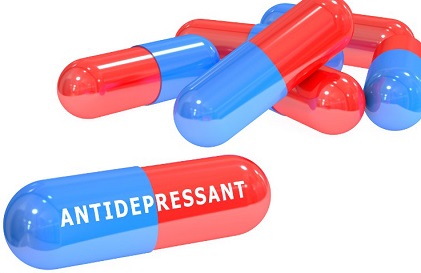Contrary To Misinformation, Swiss Study Validates That Antidepressants Or SSRIs Do Not Reduce Risk Of SARS-CoV-2 Infection
Nikhil Prasad Fact checked by:Thailand Medical News Team Mar 13, 2024 1 year, 1 month, 1 week, 6 days, 7 hours, 42 minutes ago
COVID-19 News: Antidepressant usage has seen a significant rise in the United Kingdom, with over 100 daily doses prescribed per 1000 inhabitants. Beyond their primary role in addressing depression, antidepressants have been explored for their potential impact on the immune system, particularly through functional inhibition of acid sphingomyelinase (FIASMA). There has been misinformation spread by certain medical doctors that usage of antidepressants can lower the risk of contracting pathogenic infections including SARS-CoV-2. This study covered in this
COVID-19 News report aims to investigate the association between various antidepressants and the risk of acute infections, including SARS-CoV-2, through an observational cohort study conducted by the University of Basel, and the University Hospital Basel-Switzerland.
 Swiss Study Validates That Antidepressants Or SSRIs Do Not Reduce Risk Of SARS-CoV-2 Infection
Background and Rationale
Swiss Study Validates That Antidepressants Or SSRIs Do Not Reduce Risk Of SARS-CoV-2 Infection
Background and Rationale
Previous preclinical studies have hinted at the potential immunomodulatory effects of antidepressants with FIASMA activity. Acid sphingomyelinase (ASM) inhibition, a characteristic of FIASMA, may contribute to enhanced immune cell longevity and a possible protective effect against infections. Ceramide, a key component in the immune system, plays a crucial role in controlling bacterial and viral infections. Lower ceramide concentrations, achieved through FIASMA activity, may lead to longer immune cell survival and a reduced risk of infection.
Several commonly prescribed antidepressants, including fluoxetine, sertraline, paroxetine, and venlafaxine, have shown FIASMA activity in preclinical studies. Notably, citalopram, an SSRI, demonstrated weaker FIASMA activity compared to other tested SSRIs.
Research Design and Data Source
The researchers conducted an extensive cohort study using primary-care data from the UK Clinical Practice Research Datalink (CPRD) GOLD, covering the period from 2000 to 2021. This database, compiled by general practitioners, includes de-identified health data on 16 million patients, encompassing demographics, lifestyle factors, diagnoses, medication prescriptions, laboratory test results, and referrals to secondary care.
Study Population and Drug Exposure
The study focused on patients aged 18 to 80 years who were new users of fluoxetine, sertraline, paroxetine, or venlafaxine, comparing them to new users of citalopram. The analysis aimed to assess the association of composite diagnosed acute infections, including SARS-CoV-2, in these cohorts. To control for confounding factors, propensity score (PS) fine stratification was applied.
Results and Observations
The PS-weighted cohorts included substantial numbers of new users for each antidepressant: 353,138 for fluoxetine, 222,463 for sertraline, 69,963 for paroxetine, and 32,608 for venlafaxine. Comparisons were made with the 515,996 to 516,583 new citalopram users. Post-stratification, incidence rates (IRs) ranged from 76.8 acute infec
tions per 1000 person-years (sertraline) to 98.9 infections per 1000 person-years (citalopram). Importantly, PS-weighted incidence rate ratios (IRRs) indicated no significant differences for paroxetine (0.97), fluoxetine (0.94), and venlafaxine (0.90) compared to citalopram. While sertraline initially showed a reduced IRR (0.84), this effect nullified within subgroups by cohort entry date.
The analysis extended to assessing the risk of SARS-CoV-2 infection, revealing no statistically relevant risk reduction across the various antidepressants.
Discussion
This retrospective cohort study aimed to elucidate the relationship between selected SSRIs and SNRIs and the risk of acute infections, including COVID-19. After meticulous control for confounding variables, the results indicated no differential risk of infection associated with fluoxetine, sertraline, paroxetine, and venlafaxine when compared to citalopram. These findings challenge the notion that FIASMA activity, as exhibited by certain antidepressants, translates into a protective effect against acute infections.
Conclusions
In summary, this comprehensive Swiss study contradicts prevalent fallacies by revealing that the use of fluoxetine, sertraline, paroxetine, and venlafaxine is not associated with a reduced risk of acute infections when compared with the presumably weak FIASMA citalopram. The study's robust design and extensive dataset contribute valuable insights to the ongoing discourse surrounding the potential immunomodulatory effects of antidepressants. It underscores the importance of evidence-based research in shaping our understanding of the complex interactions between psychiatric medications and immune function, ultimately guiding clinical decisions for patients with mental health conditions.
The study findings were published in the peer reviewed journal: Journal of Affective Disorders.
https://www.sciencedirect.com/science/article/abs/pii/S0165032724004166
For the latest
COVID-19 News, keep on logging to Thailand Medical News.
